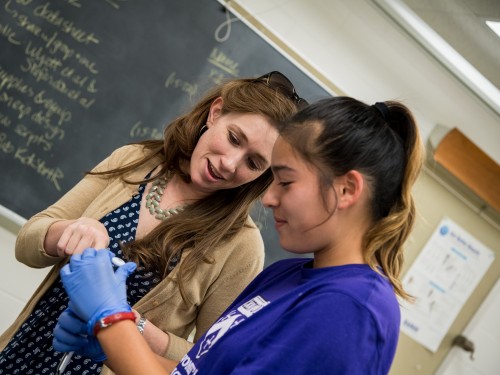One of the professorships already endowed by the Our Path Forward campaign is for a neuroscientist who uses zebrafish to study how genes direct the development of nervous systems.
Sarah Petersen holds the Ashby E. Denoon Assistant Professorship in Neuroscience, named in honor of Ashby E. Denoon ’66 and paid annually from the investment growth of a principal amount of money. Because endowed funds provide a guaranteed source of annual support, they relieve pressure on Kenyon’s annual operating budget.
Petersen collaborates with students on research involving zebrafish, an organism ideal for the lab: zebrafish grow from a single cell to a fully formed animal in less than five days, they easily absorb drugs placed in their water and they often survive mutations in their genes that humans cannot.
“When I was an undergraduate, this kind of research on a molecular level wasn’t offered,” said Petersen, whose research has examined multiple sclerosis. “And usually undergraduates are the lowest on the research totem pole at a large institution. But at Kenyon, they are really doing the research.”
Kenyon’s Neuroscience Department began in 1993 as an interdisciplinary program and became a full department in 2012. Neuroscience is now the third-most popular major in the Natural Sciences Division, behind psychology and biology.
Professor of Neuroscience and Department Chair Hewlet McFarlane said, “It’s great to have someone in the Department of Neuroscience who can do molecular analyses in-house. This really increases the range of training we can provide to our students. They can now do research projects using modern and sophisticated tools that were not available to students even a few years ago.”
Petersen received a bachelor’s degree from the University of Tennessee in 2004 and a doctorate in cell and developmental biology from Vanderbilt University in 2011.
“There are very, very few liberal arts schools that can support the kind of lab I have and the level of genetic and drug screening I do,” Petersen said.
